14 dec 2018

A horde of Jewish settlers on Thursday night attacked Akbara village, north of the 1948 occupied lands.
According to the Hebrew website 0404, dozens of settlers rallied last night at the main entrance to the Palestinian village of Akbara near Safed city, encircled it and prevented its local residents from leaving or entering it.
Quds Press said that the settlers blocked the main road leading to the village with rocks and burning tires and attacked local residents and their property.
Later, some villagers confronted the settlers and clashed with them before Israeli police forces intervened to control the situation.
Every once in a while, Jewish settlers launch attacks against Palestinian citizens and their property in different areas of the occupied territories, with no serious steps by the Israeli government to curb such crimes.
According to the Hebrew website 0404, dozens of settlers rallied last night at the main entrance to the Palestinian village of Akbara near Safed city, encircled it and prevented its local residents from leaving or entering it.
Quds Press said that the settlers blocked the main road leading to the village with rocks and burning tires and attacked local residents and their property.
Later, some villagers confronted the settlers and clashed with them before Israeli police forces intervened to control the situation.
Every once in a while, Jewish settlers launch attacks against Palestinian citizens and their property in different areas of the occupied territories, with no serious steps by the Israeli government to curb such crimes.

The Israeli occupation forces (IOF) on Friday imposed a tightened closure on Ramallah for the second day in a row.
Local sources said that the IOF closed several main roads in Ramallah, installed military checkpoints at the entrances to Ramallah villages, and blocked the Palestinian citizens' movement.
Wafa news agency reported that dozens of Palestinian houses have been searched and raided in al-Bireh city since the early morning hours.
The Israeli occupation army claimed that an Israeli soldier was moderately injured near Beit El settlement on Friday morning after a Palestinian, who later managed to fled the scene, threw a stone at him.
Dozens of Palestinians spent the previous night away from their homes and families because of the closure and the Israeli settler night riots which were accompanied by attacks on Palestinian vehicles passing on Ramallah roads.
Local sources said that the IOF closed several main roads in Ramallah, installed military checkpoints at the entrances to Ramallah villages, and blocked the Palestinian citizens' movement.
Wafa news agency reported that dozens of Palestinian houses have been searched and raided in al-Bireh city since the early morning hours.
The Israeli occupation army claimed that an Israeli soldier was moderately injured near Beit El settlement on Friday morning after a Palestinian, who later managed to fled the scene, threw a stone at him.
Dozens of Palestinians spent the previous night away from their homes and families because of the closure and the Israeli settler night riots which were accompanied by attacks on Palestinian vehicles passing on Ramallah roads.
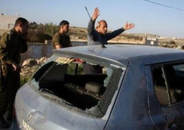
Medical sources have reported, Friday, that a Palestinian was shot and injured after an illegal Israeli colonialist settler shot him with live rounds at the Nablus-Ramallah road, near the al-Jalazoun refugee camp, north of Ramallah, in central West Bank.
Medical sources said the young man was shot in his leg, after a group of colonists invaded the area surrounding the Education Ministry, and attacked dozens of residents, cars and buildings.
The Palestinians the intercepted the colonists, and clashed with them to force them out, before the Israeli assailants fired many live rounds at them, wounding the young man.
The illegal colonists also hurled stones at Palestinian cars, causing damage.
Medical sources said the young man was shot in his leg, after a group of colonists invaded the area surrounding the Education Ministry, and attacked dozens of residents, cars and buildings.
The Palestinians the intercepted the colonists, and clashed with them to force them out, before the Israeli assailants fired many live rounds at them, wounding the young man.
The illegal colonists also hurled stones at Palestinian cars, causing damage.
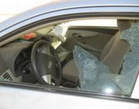
Israeli soldiers injured, Friday, dozens of Palestinians in the al-Mughayyir Palestinian town, northeast of the central West Bank city of Ramallah.
Media sources said dozens of Palestinians held a procession in the town, after performing noon prayers on their lands, in the eastern meadow area.
They added that the soldiers resorted to the excessive use of force against the nonviolent protesters, and fired many gas bombs, concussion grenades and rubber-coated steel bullets.
Many Palestinians were shot with rubber-coated steel bullets; others suffered the effects of teargas inhalation, while several residents suffered various cuts and bruises.
The Palestinians in the town are ongoing with their processions, especially since the army intends to transform its military base, which was built on stolen Palestinian lands, into an illegal colony.
In related news, groups of fanatic colonialist settlers continued to attack Palestinians, and their cars, in several parts of the occupied West Bank, especially near Ramallah, Nablus and Hebron.
Many Palestinian cars sustained serious damage, after the colonizers hurled stones at them near the al-Jalazoun refugee camp, north of the central West Bank city of Ramallah. video
Similar attacks took place near the northern West Bank city of Nablus, especially in the area of Yitzhar road, in addition to Hebron, in the southern part of the West Bank.
Israeli soldiers were seen standing not far from the colonists, who were attacking the Palestinian cars, but did not attempt to stop them.
Media sources said dozens of Palestinians held a procession in the town, after performing noon prayers on their lands, in the eastern meadow area.
They added that the soldiers resorted to the excessive use of force against the nonviolent protesters, and fired many gas bombs, concussion grenades and rubber-coated steel bullets.
Many Palestinians were shot with rubber-coated steel bullets; others suffered the effects of teargas inhalation, while several residents suffered various cuts and bruises.
The Palestinians in the town are ongoing with their processions, especially since the army intends to transform its military base, which was built on stolen Palestinian lands, into an illegal colony.
In related news, groups of fanatic colonialist settlers continued to attack Palestinians, and their cars, in several parts of the occupied West Bank, especially near Ramallah, Nablus and Hebron.
Many Palestinian cars sustained serious damage, after the colonizers hurled stones at them near the al-Jalazoun refugee camp, north of the central West Bank city of Ramallah. video
Similar attacks took place near the northern West Bank city of Nablus, especially in the area of Yitzhar road, in addition to Hebron, in the southern part of the West Bank.
Israeli soldiers were seen standing not far from the colonists, who were attacking the Palestinian cars, but did not attempt to stop them.
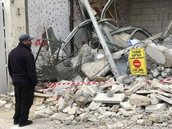
A horde of Jewish settlers, some of them armed, rallied at Awarta checkpoint, southeast of Nablus in the occupied West Bank, on Thursday and blocked a nearby road used by local residents from Awarta town.
Eyewitnesses told a reporter for the Palestinian Information Center (PIC) that over 40 settlers rallied at the checkpoint and the road, which forced Palestinian drivers to use other routes.
They expressed their belief that the settlers seemingly wanted to attack Palestinian citizens on the road.
Eyewitnesses told a reporter for the Palestinian Information Center (PIC) that over 40 settlers rallied at the checkpoint and the road, which forced Palestinian drivers to use other routes.
They expressed their belief that the settlers seemingly wanted to attack Palestinian citizens on the road.
13 dec 2018
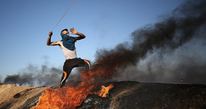
A group of armed extremist Israeli colonialist settlers invaded, on Thursday evening, Beitin Palestinian village, north of the al-Biereh city, in the Ramallah and al-Biereh Governorate in central West Bank, and shot a young man. video
Media sources in Ramallah said the settlers invaded the village, fired many live rounds and hurled stones at home and cars.
They added that dozens of locals tried to fend the attack off, before one of the armed colonists shot a young man with live fire.
Medical sources said the young man, identified as Raed Hamed, was shot with a live round in the arm, and suffered a moderate injury.
Israeli soldiers also invaded the village after the colonists infiltrated into it, and fired many live rounds, and gas bombs, at Palestinians protesting the invasion.
Media sources in Ramallah said the settlers invaded the village, fired many live rounds and hurled stones at home and cars.
They added that dozens of locals tried to fend the attack off, before one of the armed colonists shot a young man with live fire.
Medical sources said the young man, identified as Raed Hamed, was shot with a live round in the arm, and suffered a moderate injury.
Israeli soldiers also invaded the village after the colonists infiltrated into it, and fired many live rounds, and gas bombs, at Palestinians protesting the invasion.
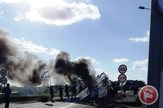
Israeli settlers demonstrated on the road leading to the Kerem Shalom commercial crossing along the southern Gaza border, on Thursday.
According to local sources, a large number of Israeli settlers gathered to demonstrate by igniting tires on fire on the road leading to the Kerem Shalom crossing. video
Sources added that the demonstrators demanded the closure of the crossing and to ban imports to the Gaza Strip.
There are three crossings into the Gaza Strip; two are controlled by Israel and one by Egypt. The Gaza-Israel crossings are the Erez crossing in the northern Gaza Strip, that is specifically for pedestrians, and Kerem Shalom in the southern Gaza Strip for the entry of goods and fuel.
The Gaza-Egypt crossing is the Rafah crossing in the southern Gaza Strip, but is often closed and lacks infrastructure for it to be a main commercial crossing.
According to local sources, a large number of Israeli settlers gathered to demonstrate by igniting tires on fire on the road leading to the Kerem Shalom crossing. video
Sources added that the demonstrators demanded the closure of the crossing and to ban imports to the Gaza Strip.
There are three crossings into the Gaza Strip; two are controlled by Israel and one by Egypt. The Gaza-Israel crossings are the Erez crossing in the northern Gaza Strip, that is specifically for pedestrians, and Kerem Shalom in the southern Gaza Strip for the entry of goods and fuel.
The Gaza-Egypt crossing is the Rafah crossing in the southern Gaza Strip, but is often closed and lacks infrastructure for it to be a main commercial crossing.
|
|
Dozens of Israeli settlers attacked Palestinian vehicles, on Thursday, the Huwwara road near the junction of the illegal Israeli settlement of Yizthar, south of the northern occupied West Bank district of Nablus.
The Mayor of Huwwara, Nasser al-Huwwari, said that one Palestinian suffered injuries during the attack due to Israeli settlers showering the Palestinian vehicles with rocks. video He confirmed that three vehicles were severely damaged by Israeli settlers. Al-Huwwari added that Israeli forces sealed off the main Nablus-Qalqiliya road, in addition to sealing off Huwwara and Awarta checkpoints in the south of the Nablus district. Local sources told Ma'an clashes broke out among Palestinian youths and Israeli forces in the Asira al-Qibliya village, also south of the Nablus district. |
Sources confirmed that the clashes led to dozens of Palestinians suffering from tear-gas inhalation.
Palestinian towns and villages in the Nablus area are surrounded by Israeli settlements and outposts, many of which are protected by the Israeli military and have gained notoriety for being comprised of the most extremist settlers.
The Palestinian government has no jurisdiction over Israelis in the West Bank, and violent acts carried out by Israeli settlers often occur in the presence of Israeli military forces who rarely act to protect Palestinian residents.
The majority of settler attacks committed against Palestinians are met with impunity, with Israelis rarely facing consequences for such attacks.
Only 1.9 percent of complaints submitted by Palestinians against Israeli settler attacks result in a conviction, the Israeli human rights group Yesh Din reported.
Between 500,000 and 600,000 Israelis live in Jewish-only settlements across occupied East Jerusalem and the West Bank in violation of international law, with recent announcements of settlement expansion provoking condemnation from the international community.
Palestinian towns and villages in the Nablus area are surrounded by Israeli settlements and outposts, many of which are protected by the Israeli military and have gained notoriety for being comprised of the most extremist settlers.
The Palestinian government has no jurisdiction over Israelis in the West Bank, and violent acts carried out by Israeli settlers often occur in the presence of Israeli military forces who rarely act to protect Palestinian residents.
The majority of settler attacks committed against Palestinians are met with impunity, with Israelis rarely facing consequences for such attacks.
Only 1.9 percent of complaints submitted by Palestinians against Israeli settler attacks result in a conviction, the Israeli human rights group Yesh Din reported.
Between 500,000 and 600,000 Israelis live in Jewish-only settlements across occupied East Jerusalem and the West Bank in violation of international law, with recent announcements of settlement expansion provoking condemnation from the international community.
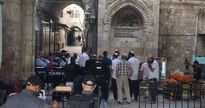
Dozens of Israeli settlers stormed on Thursday morning Jerusalem’s al-Aqsa Mosque—the third holiest site in Islam—via the Maghareba Gate.
The Islamic Awqaf Department said 33 Israeli settlers, escorted by policemen, broke into al-Aqsa Mosque as part of the morning break-in shift and carried out a round of sacrilegious tours.
At the same time, the peaceful Muslim worshipers have been subjected to tough crackdowns and restrictions by the Israeli police near the main entrances to the site.
Several worshipers have been searched and dozens more have had their IDs seized while attempting to enter al-Aqsa to perform their daily prayers.
The Islamic Awqaf Department said 33 Israeli settlers, escorted by policemen, broke into al-Aqsa Mosque as part of the morning break-in shift and carried out a round of sacrilegious tours.
At the same time, the peaceful Muslim worshipers have been subjected to tough crackdowns and restrictions by the Israeli police near the main entrances to the site.
Several worshipers have been searched and dozens more have had their IDs seized while attempting to enter al-Aqsa to perform their daily prayers.
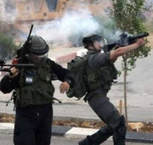
Israeli soldiers, accompanied Jewish settlers, broke into the northern West Bank village and archaeological site of Sebastia on Wednesday, upon which confrontations with the village’s Palestinian residents ensued, according to mayor of Sebastia Mohammad Azzam.
Azzam told WAFA correspondence that the soldiers accompanied a busload of fanatic settlers in a provocative visit to the site and, while they were there, the soldiers fired teargas and stun grenades into the village, causing suffocation, especially among the elderly and children.
Young residents of the village pelted the soldiers with stones while the soldiers shot back more teargas, causing more suffocation cases, said the mayor, who added that the provocations by the settlers and army, under the pretext of visiting the archaeological site, has become an almost daily occurrence.
Azzam told WAFA correspondence that the soldiers accompanied a busload of fanatic settlers in a provocative visit to the site and, while they were there, the soldiers fired teargas and stun grenades into the village, causing suffocation, especially among the elderly and children.
Young residents of the village pelted the soldiers with stones while the soldiers shot back more teargas, causing more suffocation cases, said the mayor, who added that the provocations by the settlers and army, under the pretext of visiting the archaeological site, has become an almost daily occurrence.
12 dec 2018

The Palestine Liberation Organization (PLO) held the Israeli government responsible for settler calls for the assassination of Palestinian President Mahmoud Abbas and other manifestations of settler terrorism.
PLO Executive Committee Member, Hanan Ashrawi, said in a statement, "We strongly condemn Israeli settler threats and hate language targeting Palestinian President Mahmoud Abbas, including the distribution and display of posters calling for the assassination of President Abbas."
She said the PLO regards these threats as credible and grave, "The Israeli government is directly responsible for these open calls for the President’s assassination and any escalation of hate crimes and settler terrorism against Palestinian citizens and their property."
She added, "This right-wing extremist government has lent its tacit support and protection to armed settler militias who have terrorized Palestinian civilians and carried out heinous assaults, including fatal arson attacks against defenseless families. In fact, this Israeli government is made up of the most extreme and racist representatives of the settler movement who openly and regularly foment hate speech and incitement against the Palestinian people.”
Ashrawi stressed, "The calls for the assassination of the President come in the objectionable context of hate and incitement against Palestinians, which is encouraged by the culture of impunity in Israel and the international community’s consistent failure to hold Israel accountable for its violations.”
Ashrawi called on members of the international community “to hold Israel liable for its breach of international law and to respond to these threats with the appropriate indignation and reproach.”
“Coupled with its systematic deconstruction of the prospects of peace, Israel’s reprehensible endorsement of hate speech against the Palestinian people and their leadership threatens to further destabilize the situation on the ground and condemn the region to permanent conflict.”
PLO Executive Committee Member, Hanan Ashrawi, said in a statement, "We strongly condemn Israeli settler threats and hate language targeting Palestinian President Mahmoud Abbas, including the distribution and display of posters calling for the assassination of President Abbas."
She said the PLO regards these threats as credible and grave, "The Israeli government is directly responsible for these open calls for the President’s assassination and any escalation of hate crimes and settler terrorism against Palestinian citizens and their property."
She added, "This right-wing extremist government has lent its tacit support and protection to armed settler militias who have terrorized Palestinian civilians and carried out heinous assaults, including fatal arson attacks against defenseless families. In fact, this Israeli government is made up of the most extreme and racist representatives of the settler movement who openly and regularly foment hate speech and incitement against the Palestinian people.”
Ashrawi stressed, "The calls for the assassination of the President come in the objectionable context of hate and incitement against Palestinians, which is encouraged by the culture of impunity in Israel and the international community’s consistent failure to hold Israel accountable for its violations.”
Ashrawi called on members of the international community “to hold Israel liable for its breach of international law and to respond to these threats with the appropriate indignation and reproach.”
“Coupled with its systematic deconstruction of the prospects of peace, Israel’s reprehensible endorsement of hate speech against the Palestinian people and their leadership threatens to further destabilize the situation on the ground and condemn the region to permanent conflict.”
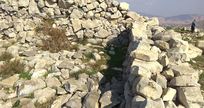
At a large plot of land located east of the top of the Mount of Ebal in the northern West Bank city of Nablus, stone chains that do not hold any archaeological significance exist, yet they are used by Israeli settlers as a self-claimed sacred archaeological site.
Israeli settlers’ attempts to seize the site they claim to be the altar of Joshua Ben Nun reveal how far settlers can go about exploiting myths and using them in their ongoing battle to control Palestinian lands.
The former Israeli Minister of Housing, Uri Ariel, promised in 2015 to open the site to Jewish settlers, to enable them to perform their Talmudic rituals.
Last month, settlers sat up a new road of more than two kilometers in the northern town of Asira, in order to facilitate their access to the site, meaning the seizure of hundreds of dunums of Palestinian land in the area.
Witnesses confirm that settlers organize weekly visits to the site every Saturday.
Archaeologist Dirgham Al-Faris, in an interview with the PIC, refuted the narrative of Israeli settlers regarding this site, pointing out that these claims are a continuation of the Zionist movement’s policy of using religious myths to mobilize Jews around the idea of the Promised Land by linking biblical sites to Jewish religious sanctity.
Facts refute myths
During the 1980s, the Israeli archeologist Adam Zeratal carried out archaeological excavations on the site. Through the pottery fragments and two Pharaonic seals found, it was revealed that the site dates back to the 13th century BC and claimed to be the altar erected by Joshua Ben Nun.
Al-Faris confirms that the existing architectural remains show that it was a Canaanite altar of idolatry, offering sacrifices to the Canaanite Gods.
“In no way can the altar be the resting place of Ben Nun, because the assumption that the altar belongs to Joshua Ben Nun contradicts the historical and archaeological facts that prove that Joshua Ben Nun is a myth and not a historical figure,” he says.
Al-Faris bases his assumptions on the results of excavations carried out by many archaeologists in Palestine, as well as by many internationally recognized archaeologists, including Israeli archaeologists, most notably Professor Israel Finkelstein, who says that Joshua is a myth, and not a historical figure.
On the other hand, the religion of the land of Canaan (Palestine) at that time was not a monothy religion, but a pagan religion. The idea of monotheism appeared in the seventh century BC, while the Jewish religion was crystallized during the Babylonian captivity and was finalized in the later stages. The Jewish faith was taught and practiced after the return from the Babylonian captivity during the Persian period in 539 BC.
Al-Faris says the claim of Zeratal has been there for more than 30 years, but he has not been taken seriously, because his idea is incompatible with the Jewish and Samaritan religious narrative, as well as with the proven scientific and historical facts.
The Samaritan community (the Palestinian Jewish community) believes that a prophet cannot set up an altar on the Mount of Ebal, which is known in the Torah as the Mount of Damn, as the Samaritans place their altar on the Mount of Gerizim, to which they perform pilgrim during their festivals.
Al-Faris explains that the outer shape of the altar is rectangular and not square, in addition to the lack of four prominent stones on the corners of the altar. The fact that the altar is located to the north of the Mount of Ebal so as not to meet the Mount of Gerizim, all made the claim of Zeratal baseless.
Military purposes
The danger lies in the use of the biblical narrative for purely settlement and military purposes and for the consecration of the Israeli occupation.
The archaeological site is located in the Bernat area of Asira al-Shamaliya. It overlooks the villages of East Nablus, Jordan Valley and Tubas Governorate, and it overlooks the western slopes of the Jordan Mountains.
By establishing a foothold for settlers on the Mount of Ebal, the occupation seeks to consecrate its military presence at the top of the mountain, which is 940 meters above the sea level, and is the highest peak in the northern West Bank.
The Israeli occupation forces (IOF) maintained presence at the top of the mountain in 1979 and built a 500 dunum military camp there, in addition to 1500 dunums in its vicinity, which farmers are denied access to, despite a decision by the Israeli Supreme Court to allow them to use it.
The IOF has built a huge military base on the Mount, which includes a military airport and radar and military communications towers.
Israeli settlers’ attempts to seize the site they claim to be the altar of Joshua Ben Nun reveal how far settlers can go about exploiting myths and using them in their ongoing battle to control Palestinian lands.
The former Israeli Minister of Housing, Uri Ariel, promised in 2015 to open the site to Jewish settlers, to enable them to perform their Talmudic rituals.
Last month, settlers sat up a new road of more than two kilometers in the northern town of Asira, in order to facilitate their access to the site, meaning the seizure of hundreds of dunums of Palestinian land in the area.
Witnesses confirm that settlers organize weekly visits to the site every Saturday.
Archaeologist Dirgham Al-Faris, in an interview with the PIC, refuted the narrative of Israeli settlers regarding this site, pointing out that these claims are a continuation of the Zionist movement’s policy of using religious myths to mobilize Jews around the idea of the Promised Land by linking biblical sites to Jewish religious sanctity.
Facts refute myths
During the 1980s, the Israeli archeologist Adam Zeratal carried out archaeological excavations on the site. Through the pottery fragments and two Pharaonic seals found, it was revealed that the site dates back to the 13th century BC and claimed to be the altar erected by Joshua Ben Nun.
Al-Faris confirms that the existing architectural remains show that it was a Canaanite altar of idolatry, offering sacrifices to the Canaanite Gods.
“In no way can the altar be the resting place of Ben Nun, because the assumption that the altar belongs to Joshua Ben Nun contradicts the historical and archaeological facts that prove that Joshua Ben Nun is a myth and not a historical figure,” he says.
Al-Faris bases his assumptions on the results of excavations carried out by many archaeologists in Palestine, as well as by many internationally recognized archaeologists, including Israeli archaeologists, most notably Professor Israel Finkelstein, who says that Joshua is a myth, and not a historical figure.
On the other hand, the religion of the land of Canaan (Palestine) at that time was not a monothy religion, but a pagan religion. The idea of monotheism appeared in the seventh century BC, while the Jewish religion was crystallized during the Babylonian captivity and was finalized in the later stages. The Jewish faith was taught and practiced after the return from the Babylonian captivity during the Persian period in 539 BC.
Al-Faris says the claim of Zeratal has been there for more than 30 years, but he has not been taken seriously, because his idea is incompatible with the Jewish and Samaritan religious narrative, as well as with the proven scientific and historical facts.
The Samaritan community (the Palestinian Jewish community) believes that a prophet cannot set up an altar on the Mount of Ebal, which is known in the Torah as the Mount of Damn, as the Samaritans place their altar on the Mount of Gerizim, to which they perform pilgrim during their festivals.
Al-Faris explains that the outer shape of the altar is rectangular and not square, in addition to the lack of four prominent stones on the corners of the altar. The fact that the altar is located to the north of the Mount of Ebal so as not to meet the Mount of Gerizim, all made the claim of Zeratal baseless.
Military purposes
The danger lies in the use of the biblical narrative for purely settlement and military purposes and for the consecration of the Israeli occupation.
The archaeological site is located in the Bernat area of Asira al-Shamaliya. It overlooks the villages of East Nablus, Jordan Valley and Tubas Governorate, and it overlooks the western slopes of the Jordan Mountains.
By establishing a foothold for settlers on the Mount of Ebal, the occupation seeks to consecrate its military presence at the top of the mountain, which is 940 meters above the sea level, and is the highest peak in the northern West Bank.
The Israeli occupation forces (IOF) maintained presence at the top of the mountain in 1979 and built a 500 dunum military camp there, in addition to 1500 dunums in its vicinity, which farmers are denied access to, despite a decision by the Israeli Supreme Court to allow them to use it.
The IOF has built a huge military base on the Mount, which includes a military airport and radar and military communications towers.
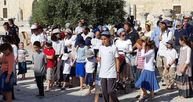
The Israeli occupation police on Wednesday morning allowed dozens of Jewish settlers to enter the Aqsa Mosque through al-Maghariba Gate and desecrate its courtyards under security guard.
According to the Islamic Awqaf Authority in Jerusalem, the Israeli police, as always, closed al-Maghariba Gate at 10:30 after the settlers completed their morning tours at the Mosque.
Later in the afternoon, the same gate is expected to be reopened for evening tours by settlers.
About 81 Jewish settlers, including 40 university and institute students, defiled the Mosque in groups under police escort.
Meanwhile, the Israeli police persisted in imposing entry restrictions on Muslim worshipers at the entrances leading to the Mosque and seized their IDs until they left the holy site.
The Aqsa Mosque is exposed to daily desecration by Jewish settlers in the morning and the afternoon except on Friday and Saturday.
According to the Islamic Awqaf Authority in Jerusalem, the Israeli police, as always, closed al-Maghariba Gate at 10:30 after the settlers completed their morning tours at the Mosque.
Later in the afternoon, the same gate is expected to be reopened for evening tours by settlers.
About 81 Jewish settlers, including 40 university and institute students, defiled the Mosque in groups under police escort.
Meanwhile, the Israeli police persisted in imposing entry restrictions on Muslim worshipers at the entrances leading to the Mosque and seized their IDs until they left the holy site.
The Aqsa Mosque is exposed to daily desecration by Jewish settlers in the morning and the afternoon except on Friday and Saturday.
